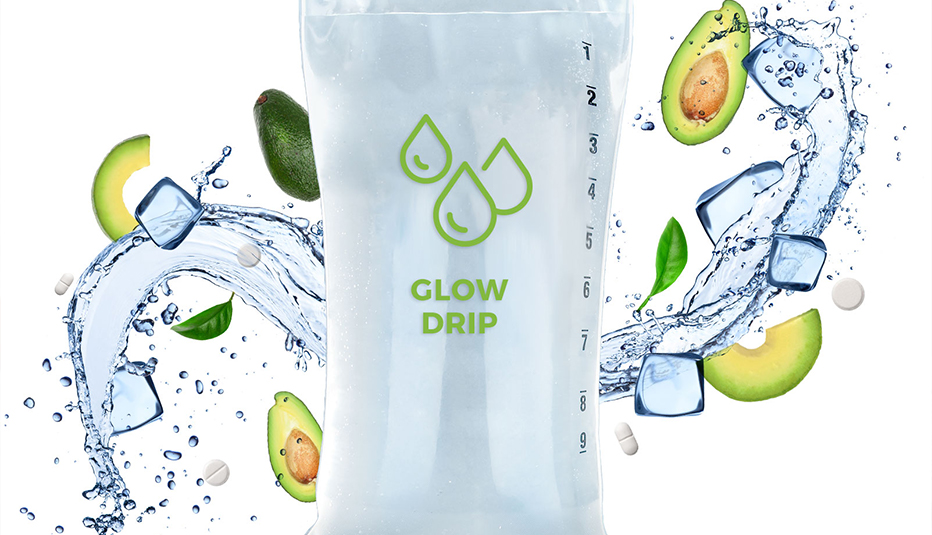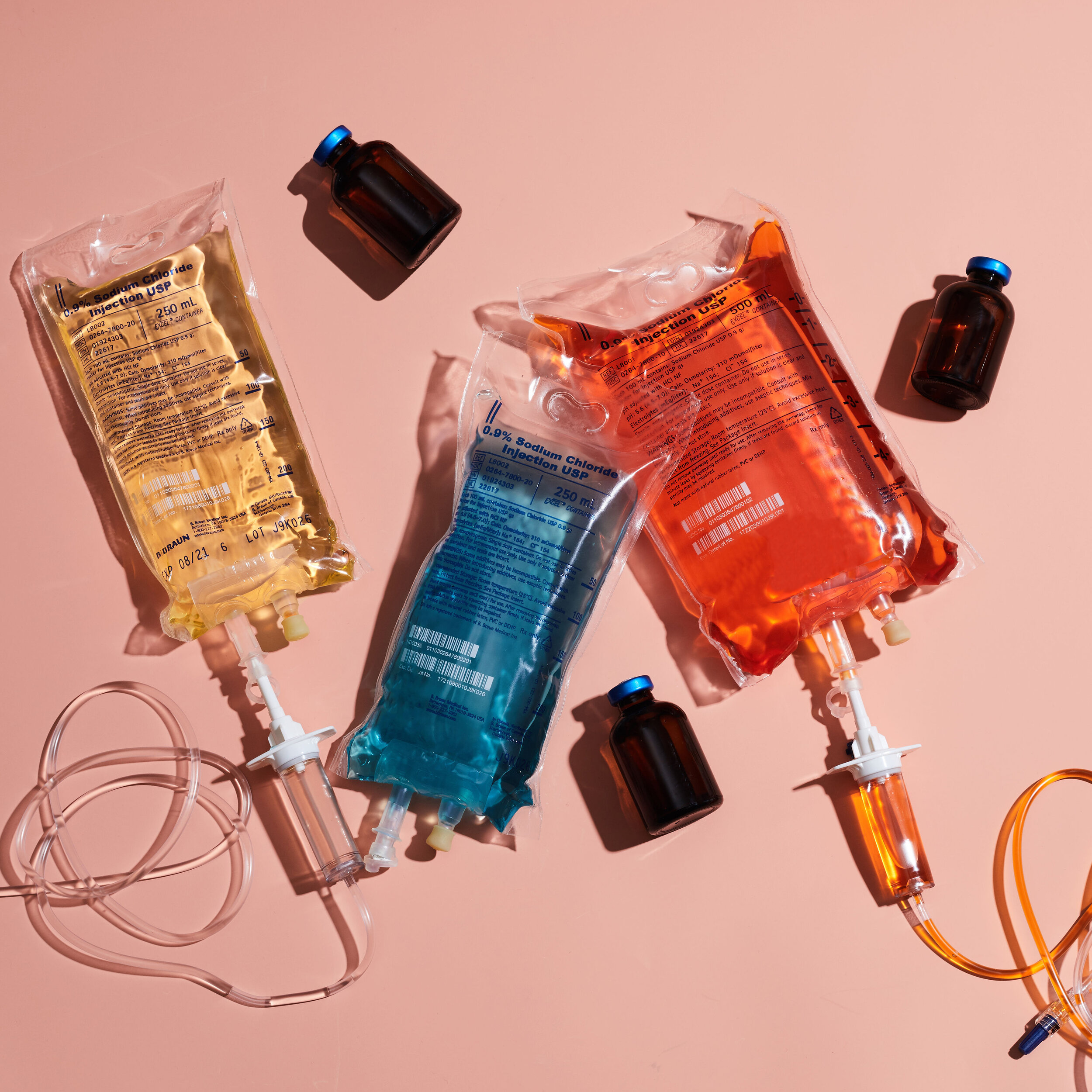

Top Glow drips in treatment in Bangalore skin rejuvenation involve customized intravenous infusions of vitamins and nutrients. This therapy aims to enhance skin health, restore vibrancy, and promote a radiant, youthful complexion.
"Glow drip treatments feature personalized blends, often incorporating vitamin C, B vitamins, glutathione, and antioxidants. This aims to enhance skin cell repair and regeneration, promoting a brighter, more youthful complexion.
Glow drip treatments are administered by licensed medical professionals in clinical settings. The procedure includes inserting an IV catheter for a 30-60 minute slow infusion of nutrient-rich solutions. Generally well-tolerated, mild side effects like nausea or light-headedness may occur.
While anecdotal evidence suggests potential benefits for skin health in glow drip treatments, further research is required to understand their full scope and associated risks. Consult with a qualified doctor for personalized assessment and guidance."

Intravenous (IV) glutathione, a sought-after aesthetic treatment, is believed to offer skin-lightening and anti-aging benefits. Yet, its cosmetic use lacks robust scientific support, raising potential risks. Caution and thorough consideration are advised before opting for this treatment.

Anti-aging: Renowned as a potent antioxidant, glutathione combats free radicals linked to aging and skin cell damage. Advocates suggest that IV glutathione could potentially diminish fine lines, wrinkles, and other visible signs of aging.
Skin lighting: Glutathione, renowned for skin-lightening, hampers melanin production. IV glutathione is thought to amplify this effect, delivering a concentrated dose directly into the bloodstream. This process is believed to contribute to a brighter and more even skin tone.
Detoxification: As a vital part of the body's detoxification processes, glutathione is thought to aid in toxin removal. IV glutathione is utilized by some individuals to support detoxification and enhance overall health.
Highlighting the significance, the use of IV glutathione for cosmetic purposes lacks approval from the US Food and Drug Administration (FDA), posing potential risks like adverse reactions, infection, and interference with natural glutathione production. Always consult a qualified doctor before any medical treatment.
As the body's natural antioxidant, glutathione safeguards cells from damage and bolsters immune function. When given through intravenous administration (IV), glutathione holds promise for various potential benefits.
Although vitamin E is vital for overall health, the current scientific evidence supporting the use of IV vitamin E therapy for addressing specific health conditions is constrained. Here are a few potential advantages connected with vitamin E:
Skin health: Vitamin E contributes to skin well-being by fostering cell renewal and aiding collagen synthesis. Additionally, it has the potential to alleviate skin inflammation.
Anti-aging properties: Vitamin E serves as a potent antioxidant, shielding the skin against free radical damage that accelerates aging. IV vitamin E might aid in diminishing fine lines, wrinkles, and enhancing skin texture.
Skin brightening: Vitamin E has the potential to enhance skin complexion and minimize the visibility of dark spots and hyperpigmentation.
Immune support: Participating in immune function, vitamin E has the capacity to mitigate inflammation and bolster the overall health of the immune system.
Improved skin health: Minimized scarring: Vitamin E has the potential to diminish the visibility of scars and facilitate the healing process in damaged skin.
Moisturizing effects: Vitamin E aids in moisturizing and hydrating the skin, offering potential benefits, particularly for those with dry or dehydrated skin conditions.
Reducing inflammation: Possessing anti-inflammatory attributes, vitamin C can mitigate redness and inflammation, promoting a calmer and healthier skin appearance.
Improved overall skin health: Essential for skin vitality, vitamin C plays a pivotal role in shielding the skin from harm induced by environmental stressors like UV radiation and pollution.
Hydration: Administering IV vitamin C may contribute to enhancing skin hydration through its support for collagen synthesis and improvement in skin elasticity.
Anti-aging properties: Vitamin C, a potent antioxidant, safeguards the skin from free radical damage that can accelerate aging. IV vitamin C might enhance skin texture and diminish the visibility of fine lines and wrinkles.
Brightening effects: Facilitating skin radiance, vitamin C diminishes the presence of dark spots and hyperpigmentation. IV vitamin C may offer notable benefits, particularly for individuals with uneven skin tone or sun damage.
Improved skin tone: Vitamin B12 could enhance skin tone by minimizing hyperpigmentation and fostering an even complexion.
Strong hair and nails: Crucial for the well-being of hair and nails, Vitamin B12 aids in sustaining the production of keratin, the protein that constitutes these structures.
Anti-aging properties: Assisting in collagen production, Vitamin B12 may contribute to minimizing the visibility of fine lines and wrinkles.
Healthy skin: Promoting cell turnover and regeneration, Vitamin B12 aids in maintaining healthy skin. Additionally, it has the potential to alleviate inflammation and redness.
Reduced inflammation: Thioctic acid may assist in alleviating skin inflammation, potentially benefiting conditions such as acne, eczema, and psoriasis.
Skin brightening: Thioctic acid may contribute to enhancing skin tone and minimizing the visibility of dark spots and hyperpigmentation.
Improved skin health: Contributing to skin well-being, thioctic acid encourages collagen production and aids in cell regeneration.
Anti-aging properties: Thioctic acid serves as a powerful antioxidant, safeguarding the skin against free radicals linked to premature aging. Administered intravenously, thioctic acid may diminish fine lines, wrinkles, and enhance overall skin texture.
Detoxification: Thioctic acid may aid in detoxifying the body, promoting overall health. It's crucial to recognize that the beauty benefits of IV thioctic acid can differ based on individual skin concerns. High doses might interact with medications or induce side effects, underscoring the importance of discussing potential risks and benefits with a doctor before undergoing treatment.
Epidermal Growth Factor (EGF), a naturally occurring protein in the human body, plays a vital role in cell growth and regeneration. Widely utilized in skincare products and aesthetic treatments, IV EGF is a recent addition to beauty treatments, with ongoing investigations into its effectiveness.
Certain reasons to consider IV EGF in beauty treatments could be:Skin Rejuvenation: EGF may promote cell regeneration, contributing to a more youthful and revitalized complexion.
Fine Lines and Wrinkles: IV EGF could be considered to address the appearance of fine lines and wrinkles, supporting skin elasticity.
Hyperpigmentation: EGF may be used to help reduce the visibility of dark spots and hyperpigmentation, contributing to a more even skin tone.
Scarring: Some individuals may explore IV EGF for its potential role in minimizing the appearance of scars and supporting skin healing.
It's important to note that the use of IV EGF in beauty treatments is an evolving area, and individual responses may vary. Consulting with a qualified healthcare professional is advisable to determine its appropriateness for specific concerns and goals.
Derived from natural sources, Kojic acid is frequently incorporated into skincare formulations to alleviate hyperpigmentation issues like age spots, sun spots, and melasma. The efficacy of IV Kojic acid, a novel approach in aesthetics, is currently under research. Here some advantages of IV Kojic acid treatment:
Hyperpigmentation Treatment: IV Kojic acid is utilized to address hyperpigmentation issues, including age spots, sun spots, and melasma.
Melanin Inhibition: By inhibiting melanin production, Kojic acid helps lighten dark spots and contributes to a more uniform skin tone.
Aesthetic Use: As a relatively new approach in aesthetics, IV Kojic acid is being explored for its potential benefits in skincare treatments.
Minimization of Age Spots: The application of IV Kojic acid may assist in reducing the appearance of age-related skin discolorations.
Sun Damage Reduction: Kojic acid is known for its potential to mitigate the effects of sun damage on the skin.
Skin Brightening: Kojic acid functions as a skin-brightening agent, promoting a more even and radiant complexion.
Melasma Improvement: Individuals with melasma may find IV Kojic acid helpful in addressing and improving this particular form of hyperpigmentation.
It's essential to note that individual responses to IV Kojic acid may vary, and consulting with a qualified healthcare professional is recommended for personalized advice and guidance.
Zinc: Advantages: Supports wound healing, collagen formation, and immune function. Can contribute to a clearer complexion.
Selenium: Advantages: Antioxidant properties may help protect the skin from oxidative stress and support a healthy immune system.
Copper: Advantages: Promotes collagen synthesis, which is essential for skin elasticity and wound healing.
Magnesium: Advantages: Supports overall skin health, aids in hydration, and contributes to a balanced complexion.
Manganese: Advantages: Essential for collagen production and may contribute to maintaining skin elasticity.
Silicon: Advantages: Supports collagen and elastin production, contributing to skin firmness and elasticity.
Sulfur: Advantages: Helps maintain the structure of proteins in the skin and supports a healthy complexion.
Glow drips containing essential minerals offer potential benefits such as enhanced skin health, diminished inflammation, reduced oxidative stress, heightened energy levels, and an overall improvement in health and well-being.
Those with a history of heart disease or other cardiovascular issues may face an elevated risk of experiencing fluid overload or electrolyte imbalances, potential complications associated with IV therapy.
People with kidney disease or reduced kidney function may face a higher likelihood of experiencing electrolyte imbalances, and the situation can be intensified by intravenous (IV) therapy.
People with liver disease or compromised liver function may be more susceptible to complications arising from IV therapy. This is because the liver plays a crucial role in processing numerous substances delivered through IV drips.
Pregnant individuals are often advised against undergoing glow drip treatments due to potential risks to the developing fetus.
Those who have allergies to any components in the IV drip should refrain from undergoing the treatment.

The frequency at which glow drips are administered is contingent on diverse factors, including the individual's overall health, specific health objectives, and the composition of nutrients in the drip. Typically, a qualified doctor should determine the frequency of glow drip administration based on an assessment of the individual's unique requirements and the ongoing monitoring of their response to the treatment.
As a general rule, numerous providers advise administering IV drips no more frequently than once per week. This precaution is taken to minimize the potential risks of complications, such as electrolyte imbalances or infections.
As a standard practice, many healthcare providers recommend limiting the administration of IV drips to no more than once a week. This measure is implemented to mitigate the potential risks associated with complications, including electrolyte imbalances or infections.
The term "glow drip" refers to a specialized form of intravenous (IV) drip therapy designed to enhance the appearance of the skin, imparting a youthful and radiant glow. These drips usually contain a combination of vitamins, minerals, antioxidants, and occasionally other compounds. Health or beauty clinics frequently offer these treatments.
It's crucial to recognize that factors like skin type, overall health, and lifestyle can influence the effectiveness of any medical or aesthetic treatment. Before choosing glow drips or any skin-enhancing therapy, it's recommended to consult with a licensed healthcare provider or dermatologist. By understanding your specific needs and situation, they can provide personalized guidance and recommendations.
Skin Irritation or Bruising: The insertion of the IV needle may cause mild skin irritation or bruising at the injection site. While these effects are usually temporary, individuals with sensitive skin may be more prone to such reactions.
Allergic Reactions: Some people may be allergic to specific components in the glow drip, such as vitamins or minerals. Allergic reactions can manifest as itching, rash, or, in severe cases, difficulty breathing. It's essential to disclose any known allergies to healthcare providers beforehand.
Infection at Injection Site: Despite using sterile techniques, there is a risk of infection at the injection site. Redness, swelling, or tenderness at the puncture site may indicate an infection, and prompt medical attention is necessary if these symptoms occur.
Electrolyte Imbalances: Certain formulations of glow drips may contain high concentrations of electrolytes. Excessive intake of these minerals can disrupt the body's balance, leading to symptoms like irregular heartbeat, muscle weakness, or fatigue.
Fluid Overload: Infusing large volumes of fluids rapidly can result in fluid overload, causing symptoms such as swelling, shortness of breath, or increased blood pressure. Monitoring the rate of administration is crucial to prevent this complication.
Organ Dysfunction: In rare cases, especially for individuals with pre-existing health conditions, the administration of certain nutrients intravenously may affect organ function. It's important for healthcare providers to assess the individual's medical history thoroughly and tailor the glow drip accordingly to minimize this risk.
It's crucial for individuals considering glow drip treatments to consult with qualified healthcare professionals before undergoing such therapies. A thorough assessment of one's health history and individual needs can help determine the appropriateness of the treatment and minimize the risk of potential side effects.
Before deciding whether IV glow drips are worth the money, individuals should consult with licensed healthcare providers or dermatologists. These professionals can offer insights based on an individual's unique circumstances and provide a more informed perspective on the potential benefits and risks associated with such therapies. Additionally, researching reviews and testimonials from reputable sources can help individuals make more informed decisions about investing in IV glow drip treatments.
Before undergoing any IV drip therapy, individuals should thoroughly research the provider, inquire about the specific ingredients in the drip, and consult with a licensed healthcare professional to ensure the treatment is suitable for their individual needs and health status.
Limited Scientific Evidence: The scientific evidence supporting the effectiveness of skin-whitening drips is limited, and more research is needed to establish their safety and long-term outcomes.
Regulatory Issues: In many places, the use of certain substances, such as high doses of glutathione for skin whitening, may not be approved by regulatory authorities. The safety of such substances when administered intravenously is not well-established.
Risk of Adverse Effects: Skin-whitening drips may be associated with various side effects, including allergic reactions, skin rashes, kidney damage, and disruption of electrolyte balance. The safety profile can vary depending on the specific ingredients used and individual health conditions.
Individual Variability: Responses to skin-whitening treatments can vary widely among individuals. Factors such as genetics, overall health, and skin type may influence the outcomes and potential side effects.
Lack of Standardization: The lack of standardized protocols for skin-whitening drips contributes to the uncertainty surrounding their safety. Inconsistent formulations and dosages can increase the risk of adverse effects.
Long-Term Effects Unknown: The long-term safety of repeated or prolonged use of skin-whitening drips has not been thoroughly studied. This raises concerns about potential risks over time.
Before considering any skin-whitening procedure, it is crucial to consult with a qualified healthcare professional. They can assess your individual health status, discuss potential risks and benefits, and provide guidance on safer alternatives for achieving your desired skin outcomes. It's important to prioritize treatments that have been thoroughly researched and proven to be safe and effective.
Glow drips, which are a form of intravenous (IV) therapy aimed at enhancing skin health and appearance, may have potential side effects. It's important to note that individual responses can vary, and not everyone will experience these effects. Here are some potential side effects associated with glow drips:
It's important to discuss potential side effects with the healthcare provider administering the glow drip and disclose any relevant medical history or allergies. Monitoring during and after the treatment session, along with adherence to proper sterile techniques, can help mitigate potential risks. Individuals considering glow drip treatments should seek guidance from qualified healthcare professionals to ensure the procedure is appropriate for their specific needs and health conditions.
In the realm of IV drips crafted for skin lightening, a variety of clinics and providers may showcase their unique formulations. However, certain components commonly found in these IV drips are believed to contribute to promoting skin lightening. It is essential to emphasize that, despite potential benefits, there is limited scientific data available to definitively validate the specific effects of these substances on improving skin brightness.
Copyright @ VCUS Healthcare Center. All Rights Reserved | Designed By Channel Softech